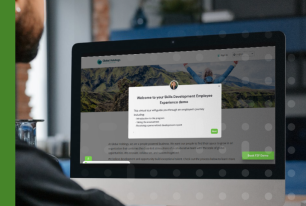How to Prioritize Your Mental Health During the Holidays
Tips for pursuing productivity over busyness, prioritizing mental health, and supporting the mental health of your team during the holidays.
Share
We are in full swing into this year’s holiday season, and this means packed calendars, stretching to meet work goals, spending quality time with friends and family, and for some, sadness and isolation. No matter your life situation, ‘the most wonderful time of the year’ often comes with excitement and anticipation, but also family conflict, financial strain, and struggle to balance work and life commitments. So, it is no surprise that many struggle with mental health during the holidays and experience as Elvis would say a ‘blue Christmas’ consumed by feelings of stress, anxiety, depression, and loneliness.
My own experiences of both joy and stress during the holidays have left me wondering, how might I better manage my life during the holidays so I can stay present and healthy? And how might I better support those around me to encourage their mental health and balance? These questions have led me to the relentless prioritization of mental health.
Understanding busyness vs. productivity
If you are anything like me, right now I am BUSY. So as I contemplate ways to stay in the moment, lean into joy, and minimize stress, I am reminded about the importance of distinguishing between busyness and productivity.
- When we are busy, we are often engaged in work all day but do not seem to check tasks off the to-do list or make progress on important projects or goals. This leaves us feeling overwhelmed, overworked, and disengaged.
- When we are productive, we accomplish our most important tasks, produce results, and move work forward. This gives us purpose and leaves us feeling fulfilled and engaged.
Prioritizing mental health during the holidays
We all fall into the busyness trap and find ourselves feeling like hamsters on a wheel from time to time. Similarly, we often place value on busyness, making a false connection between being busy and being important. So, how might we audit our behavior in the effort to pursue productivity and better mental health, especially during the busiest time of the year?
- Ruthless prioritization: This means making hard choices about where to spend your time: identifying the most important tasks and finishing them first, even when easier, faster, or more urgent tasks arise. Losing the balance between urgency and importance is a common trap that leads us to fall into busyness over productivity. Ruthless prioritization means that you will have to pull in different resources, push deadlines, and just say no. Doing so feels hard in the moment but leads to better professional and personal outcomes in the long run.
- Commitment to a mental health routine: When life gets busy, it is easy to forgo sleep, give up your workout, grab takeout, and give away your personal time to get more done and say yes to people. But, giving up your routine leads to poorer quality work, less emotional intelligence, and worse decision-making, which impacts both work and personal effectiveness (e.g., having that extra drink to manage stress). Each act is a small sacrifice, but healthy routines are the key to maintaining physical and mental health and thus should be protected at nearly all costs.
- Removing value from the word ‘busy’: Words matter, and the way we speak impacts the message others hear and reflects the values we hold. This takes intent but consider changing your everyday language from “I’m too busy” to something more like “Let’s discuss what I might shift to make this a higher priority.” Changing the way we approach the conversation allows us to keep an open mindset, creatively problem solve in times of stress, collaborate more seamlessly.
When we are productive, we accomplish our most important tasks, produce results, and move work forward. This gives us purpose and leaves us feeling fulfilled and engaged.
Managing the mental health of your team
For leaders, this prioritization and pursuit of mental health extends beyond yourself. Your team watches your behavior and the way you prioritize your own mental health and communicate the value of mental health directly impacts your team’s behavior and priorities. So, how do we encourage others to prioritize their mental health?
- Psychological safety: Psychological safety is the ability to share your feelings and thoughts without fear of negative consequences. Creating an environment where team members can express their concerns, seek guidance, challenge assumptions and expectations, and most importantly ask for help is the first and most important step in creating a culture where employees feel empowered to pursue balance and prioritize their mental health.
- Celebrating diversely: In an effort to celebrate success, recognize accomplishments, and spend time together having fun as a team, leaders often plan events around a limited set of holidays or curate social experiences that adhere to their preferences. While these efforts have positive intent, they can miss the opportunity to foster belonging and inclusion. Make sure your social events acknowledge the beliefs, customs, and preferences (e.g. non-alcoholic ‘mocktails’) of all team members to truly celebrate and recognize differences.
- Being vulnerable: Being vulnerable with your team means stepping out of your comfort zone to connect on a human level. Talk about mental health in general. Talk about your strategies to focus on mental health and invite others to share how they are really doing. Being vulnerable means listening and demonstrating empathetic leadership, but it is not your role to fix others or to be a therapist. Rather, be prepared with questions and know your resources, like an Employee Assistance Program (EAP), to authentically support your team.
I have no disillusions about how challenging it is to commit to these behaviors, especially during the holiday season. In fact, prioritizing mental health during the holidays is not a one-day task and limited to a season. Instead, the prioritization of mental health is a lifelong pursuit, and each of us will have successes and struggles along the way. Consistently pursuing productivity over busyness, working at a steady pace, and encouraging others to pursue mental health gradually become a habit and can longitudinally improve mental health outcomes.
Want to learn more about how to prioritize mental health and its impact on your personal life and professional performance? Check out these best practices for setting boundaries and disconnecting from work.









